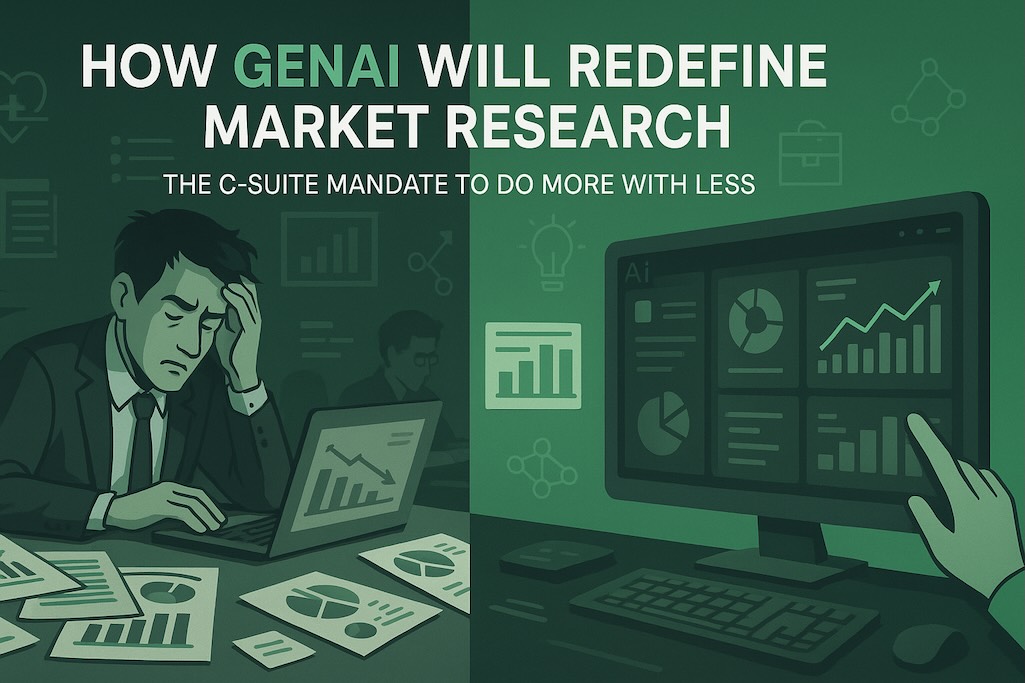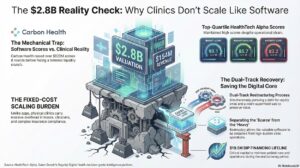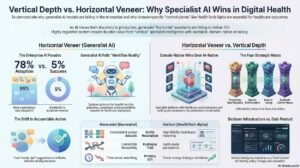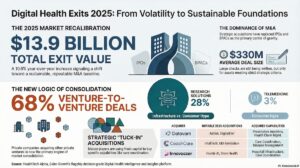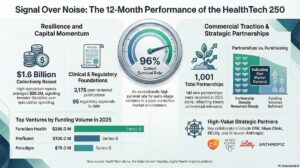TL;DR
- Generative AI in market research is transforming how corporates collect, analyse, and act on data — redefining the entire research-to-decision process.
- At the C-suite level, the mandate is clear: do more with less by fully leveraging Generative AI (GenAI) to drive efficiency and impact.
- GenAI is transforming corporate market research by automating data collection, synthesis, and analysis — creating faster, more scalable insights.
- This shift demands more than adding AI to existing systems; it requires a complete redesign of research processes and resources to maximise value.
- Many research teams still use data and intelligence providers inefficiently, resulting in fragmented, repetitive, and error-prone work.
- Corporations must move from information gathering to decision enablement, embedding AI directly into workflows.
- The impact is particularly strong for Digital Health, competitive intelligence, business development, and M&A teams — all reliant on high-quality, real-time insights.
- Galen Growth, through HealthTech Alpha and its GenAI-powered research engine, API, and advisory capabilities, enables corporates to achieve this transformation.
The Shift Toward Generative AI in Market Research
Corporate leadership is under intense pressure. At the C-suite level, the mantra is now “do more with less” — deliver growth, improve productivity, and reduce costs simultaneously. Generative AI (GenAI) is at the heart of this agenda.
Yet the challenge for market research goes far beyond adopting a GenAI tool. It requires a fundamental redesign of how research is conducted — from data collection and synthesis to reporting and decision-making. Simply adding GenAI into outdated processes will not deliver real value.
Generative AI allows corporations to:
- Aggregate fragmented sources (reports, filings, press releases, databases) in seconds.
- Synthesise unstructured data into concise, context-aware outputs such as competitor profiles and trend analyses.
- Provide next-best-action recommendations rather than static reports.
- Deliver insights in workflow-ready formats — dashboards, slides, or even draft RFP responses.
The scale of change means that entire processes and team structures must be redesigned to optimise for automation, accuracy, and speed.
The Efficiency Gap
Many corporate research teams still operate inefficiently. Despite spending heavily on data subscriptions, intelligence platforms, and consulting reports, they often:
- Duplicate efforts across business units.
- Manually reformat and validate data.
- Repeat basic research tasks for each new request.
- Introduce errors through fragmented, spreadsheet-driven processes.
The result is cumbersome, repetitive, and error-prone work. GenAI offers an opportunity to eliminate inefficiency — but only if teams embrace a complete workflow redesign rather than layering new tools onto old habits.
What This Means for Corporations
Efficiency Becomes the Baseline
Where speed once provided an advantage, GenAI makes it the new baseline. Corporations will now be judged not by how fast they gather data, but by how well they act on it.
Research Teams Will Be Redeployed
Manual tasks will be automated. Teams must evolve from data collectors to strategic interpreters, ensuring GenAI-generated outputs are reliable, contextualised, and aligned with business goals.
Budgets and Sourcing Will Shift
Reliance on external consultancies will decline as corporates internalise GenAI-powered platforms. Vendor strategies will pivot from generic reports to specialised, evidence-based intelligence.
Trust and Explainability Become Critical
AI hallucinations and opaque data sources pose serious risks. Corporations cannot base multimillion-dollar M&A or BD decisions on unverified insights. Research teams must ensure transparency and traceability for every AI-generated output.
Integration Defines Advantage
The winners will not simply adopt GenAI tools — they will embed AI across the entire research-to-decision pipeline, from pipeline monitoring and partner scouting to due diligence and post-merger integration.
Why It Matters to Key Corporate Teams
Digital Health Teams
For corporates in the Digital Health ecosystem, manual tracking cannot keep pace with the rapid emergence of new funding rounds, partnerships, and clinical milestones. GenAI enables:
- Real-time scanning of venture activity.
- Rapid identification of potential partners or acquisition targets.
- Evidence-backed assessments of product maturity and market readiness.
Competitive Intelligence Teams
Charged with tracking competitors across geographies and therapeutic areas, these teams can now:
- Automate horizon scanning across thousands of sources.
- Instantly benchmark competitors across KPIs.
- Generate alerts and executive summaries in near real time.
Business Development Teams
Business development functions often spend weeks on preliminary research. GenAI compresses this cycle by:
- Producing curated opportunity lists.
- Preparing meeting packs tailored to prospects.
- Suggesting next-best actions for outreach.
M&A Teams
Due diligence and pipeline management are resource-intensive. GenAI can:
- Flag ventures showing readiness or distress signals.
- Generate automated due diligence summaries.
- Support valuation models with integrated market benchmarks.
How Corporations Must Adapt
1. Reframe Research as Decision Enablement
Shift from gathering information to enabling decisions. Teams must validate and contextualise AI-generated insights to align with corporate goals.
2. Invest in Trustworthy Data Foundations
LLMs are only as reliable as their data. Corporations must rely on structured, validated, domain-specific datasets, not generic or unverified sources.
3. Redesign Workflows to Integrate AI Outputs
Embed GenAI insights directly into CRM systems, deal pipelines, and BI dashboards — creating a living intelligence layer that evolves with new data.
4. Upskill Teams in AI Literacy
Analysts must learn to interpret GenAI outputs, validate recommendations, and communicate findings responsibly.
5. Adopt Hybrid Sourcing Models
Combine GenAI automation with strategic consultancy input for depth and verification. The future of market research is hybrid — human expertise enhanced by explainable AI.
How Galen Growth Can Help
At Galen Growth, we have built HealthTech Alpha, the world’s leading actionable intelligence platform dedicated to Digital Health.
It integrates more than 50,000 ventures, over 1 billion data points, and proprietary signals — including Evidence, Partnership, Health Check, and Alpha Score — now enhanced with GenAI-powered Copilot capabilities to transform how corporates manage their market research.
We go further by offering:
- GenAI Research Engine: A purpose-built engine within HealthTech Alpha that automates tasks such as benchmarking, meeting preparation, and opportunity scans — all grounded in explainable, evidence-based data.
- GPT Integration: Corporations can connect their own in-house GPT directly to HealthTech Alpha, turning it into a trusted, domain-specific data layer powering internal workflows.
- Outsourced Research Services: Corporations can delegate research directly to Galen Growth, leveraging both analyst expertise and AI capabilities for faster, higher-quality outputs.
By combining domain-specific data, GenAI technology, and strategic support, Galen Growth ensures corporations not only adopt GenAI — but also extract maximum value from it.
Conclusion
Generative AI is not just another research tool; it is a structural shift in how corporates create and act on intelligence.
The C-suite mandate to “do more with less” requires a complete redesign of research processes, resources, and models.
Teams that cling to outdated, manual workflows — often duplicating effort across fragmented data providers — will fall behind.
Those who embrace GenAI, integrate explainable automation, and focus on decision enablement will elevate their strategic impact.
For Digital Health, competitive intelligence, business development, and M&A teams, the implications are immediate: faster insights, lower costs, and stronger decisions.
With HealthTech Alpha’s GenAI research engine, GPT API, and advisory services, Galen Growth helps corporations transform inefficiency into insight — turning data into decisive action.


